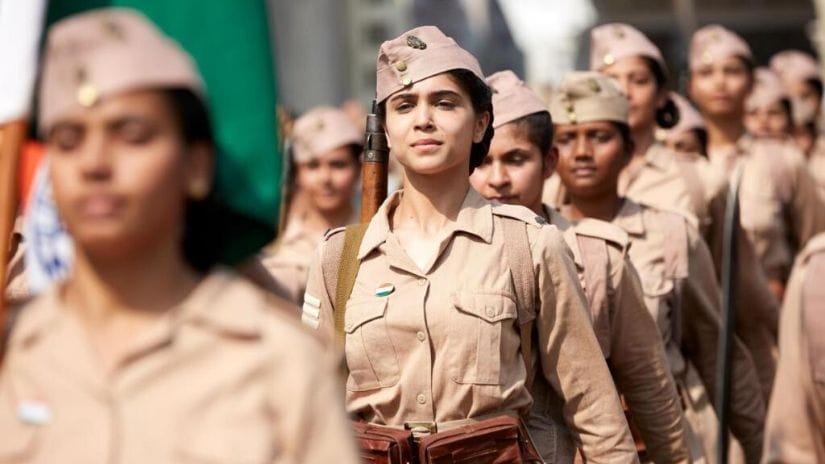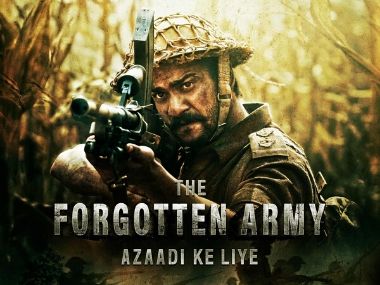“The struggle to achieve freedom was relatively easy. That was our battle. The struggle to preserve freedom is much more difficult.”
Kabir Khan’s highly ambitious five-part miniseries The Forgotten Army: Azaadi Ke Liye is a dramatised account of the founding of the Indian National Army, and their role in India’s freedom struggle. But Kabir Khan’s intention is not just to revisit the forgotten pages of our history — his show is a political statement about the current politics of India. Having released a
documentary on the same subject back in 1999, Khan has toyed with his source material for over two decades. In several
interviews prior to the release of the show, Khan has also revealed how eager he has been to tell this particular story; which is perhaps why The Forgotten Army comes across as a highly researched project which lands with the subtlety of a sledgehammer. [caption id=“attachment_7951251” align=“alignnone” width=“825”]
 A still from The Forgotten Army: Azaadi Ke Liye[/caption] Make no mistake, The Forgotten Army will whet the appetite of those who have grown up with a generous helping of jingoism patriotism in form of films like The Legend of Bhagat Singh (2002) and Border (1997), with its rousing background score belted out the inimitable Jubin Nautiyal, strategic slow-motion shots, infographic maps and seamless interweaving of fiction with archival footage. Where it falters, though, is in its eagerness to establish its noble intentions. The show is contextualised with two timelines — one, which recounts the events that led to INA’s inception — and the other in 1996 Burma, where students are campaigning for democracy. The story begins in the 1990s, when an aged Captain Surindhar Sodhi (MK Raina) returns to his extended family in Singapore to visit his bedridden sister (Sushma Seth). Once a part of the Indian National Army, he is now known as the “family weirdo” for remaining incognito for most of his life. Shuttling between these two timelines, then, Sodhi starts recounting his time in Singapore, when he was serving the British Indian Army. The rest of the narrative is pretty much about a blooming romance between a younger Sodhi (Sunny Kaushal) and Maya Shrinivasan (Sharvari Wagh), a budding photographer who enrolls herself into the INA after a moving speech by Subhash Chandra Bose, against the backdrop of the formation of the INA. But The Forgotten Army is no Veer Zara — decade-spanning and conflict-ridden as it may be, the love story doesn’t leave much of an impact. Director Kabir Khan’s attempt at revisiting history is definitely not a disservice to it. In a sea of recent period films that have manipulated historical narratives for convenience, The Forgotten Army takes care to not maim and dismember the truth (well, in most cases). Khan takes his time to chronicle the journey of the British Indian forces. Rather than drowning audiences in the jargon of patriotism, the first two episodes take a heedful look at the human cost of war. It further raises questions about identity and displacement from the lens of colonised expatriate Indians. What does patriotism mean to people who have never visited their motherland? Where does one align one’s loyalty? [caption id=“attachment_7951271” align=“alignnone” width=“825”]
 A still from The Forgotten Army: Azaadi Ke Liye[/caption] This is perhaps why the lack of nuance in the latter episodes bulldozes right through one’s cranium. What starts with Maya dispelling Sodhi’s reservations about “non-martial races” joining the army, with the former educating him about how the British have been utilising racial, social and religious criteria to recruit soldiers, quickly escalates to become a full-blown sermon on diversity and inclusion. Twice in one episode, we are told that the Rani of Jhansi regiment is the first all-female combat regiment of the world. The veracity of the statement is
questionable; but even if one were to believe it to have been an artistic license on the director’s part, the excessive emphasis on the ‘power of women’ is hammered home almost to the point of exhaustion. The parallel narrative, set in a tumultuous 1996 Burma, was perhaps included to showcase the timelessness of the spirit of dissent in an authoritarian regime. While its resemblance with 2020 India is scary, the characters in this segment are too sketchily written to evoke a sense of empathy. Amar (Karanvir Malhotra), the grand-nephew of Captain Sodhi, is an aspiring journalist. But that’s just about what you get to know about him throughout the show. Why he feels so passionately about journeying to Burma and cover the student protests, or why he lets his grand-uncle, who he clearly isn’t very fond of, piggyback with him is never addressed in its five-episode duration. The filmmaking aside, the earnest performances by Kaushal, Wagh, Rohit Chaudhary as Sodhi’s friend Arshad and TJ Bhanu as Rasamma keep you invested into the show. The spectacular camerawork and the decent CGI makes it quite a binge-worthy and immersive cinematic experience. Perhaps if Khan had taken a more “show, not tell” approach, his maiden dive into the digital space could have been etched in history. For now, The Forgotten Army can serve as a fun pre-ICSE revision bullet.


)
)
)
)
)
)
)
)
)



